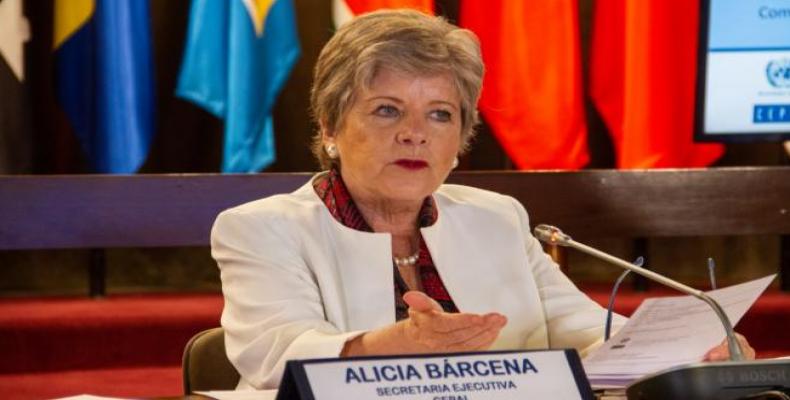The pandemic of the coronavirus (COVID-19) illness demands that we build a new development model, with more redistributive institutions that have greater concern for minorities, women and older persons, without forgetting about climate change either, Alicia Bárcena, Executive Secretary of the Economic Commission for Latin America and the Caribbean (ECLAC), indicated this Monday during a high-level virtual seminar organized by the EU-LAC Foundation, headquartered in Hamburg (Germany).
The highest authority of this United Nations regional commission also called on the European Commission to pursue a “new green deal,” as Latin America and the Caribbean has been doing, so that both can converge towards a more democratic, less unequal and more sustainable world.
The webinar entitled “How are regional organizations responding to the pandemic and what opportunities for cooperation exist?” was led by Paola Amadei, Executive Director of the EU-LAC Foundation. The other speakers included Edita Hrda, Managing Director for the Americas at the European External Action Service (EEAS); Mauricio Escanero, Mexico’s Ambassador to the European Union, in his capacity as representative of the Presidency Pro Tempore of the Community of Latin American and Caribbean States (PPT CELAC); Douglas Slater, Assistant Secretary-General of Human and Social Development at the Caribbean Community (CARICOM); Claudia Gintersdorfer, Head of the Americas Regional Division of EEAS; Olinda Salguero, Chief of Staff for the General Secretariat of the Central American Integration System (SICA); and Guy van der Eede, Acting Director for Health and Consumers at the European Commission’s Joint Research Centre. The virtual gathering was moderated by Adrián Bonilla, the EU-LAC Foundation’s Appointed Executive Director.
In her presentation, Alicia Bárcena underlined that the COVID-19 pandemic encourages us to think about the dominant economic-trade model. The privatization of health systems has given rise to a huge fragmentation revealing the enormous inequality that exists in our region, she stressed.
Bárcena highlighted that the COVID-19 pandemic is planetary in scope and therefore requires a coordinated global response. “No country will be able to save itself by itself, even less so in a world that is more interconnected today than at any other time in the history of humankind. So said the United Nations Secretary-General António Guterres, forcefully and clearly, in the letter he addressed to the leaders of the G20 on March 23rd,” she indicated.
ECLAC’s Executive Secretary recalled that the region of Latin America and the Caribbean will suffer severe effects due to the coronavirus. Last week, the Commission released its COVID-19 Special Report No. 2 with new economic forecasts, in which it estimated a -5.3% contraction in regional GDP for 2020 – the worst fall in the region since the Great Depression of the 1930s and the crisis of 1914. Meanwhile, regional exports are seen dropping by around 15% this year. In addition, nearly 12 million more people are forecast to be unemployed in the region, in a labor force where 53% of jobs are informal, which is especially serious. This will lead to us having 30 million more people in situations of poverty, she said.
“The world of the future is going to be completely different. Companies are recalculating, there is a reorganization of economic geography to depend less on imported manufactured goods. We will have to turn again to regionalization and to regional integration, since the global chains will surely be organized around three poles: the Americas, Europe and Asia-Pacific,” she explained.
She added that international cooperation is more urgent on the fiscal side of things. Many countries in the region are considered to be middle income – some of them in the Caribbean, which are already highly indebted – which means they are not granted low-cost concessional facilities, or low interest rates. “We are also calling for multilateral organizations to make loans at favorable interest rates and to provide relief to highly indebted countries, deferring their debts or forgiving them. Otherwise, the payments will be impossible and fiscal space will be compromised,” Bárcena said.
Furthermore, the senior United Nations official indicated that it is necessary to forge a much more solid concept of cooperation with Europe. “We already have it, but it needs to be reinforced. We must go beyond this because there is going to be a reconfiguration of trade. The question is how do we ensure that a market of 650 million inhabitants such as ours can have an important role and better collaboration on technological and digital matters, in fact, on all matters,” Bárcena said.
In her remarks, Alicia Bárcena recalled that CELAC has requested that ECLAC produce studies on the pandemic’s economic and social effects in the region, while also formulating recommendations for their mitigation. In response to this mandate, the Commission has created a COVID-19 Observatory, which compiles and makes available the public policies that the region’s 33 countries are adopting, along with the analysis of their economic and social effects.
source: eclac


